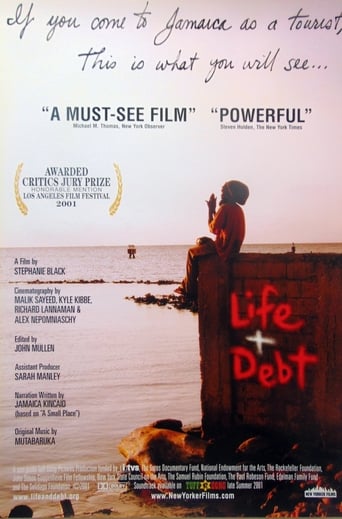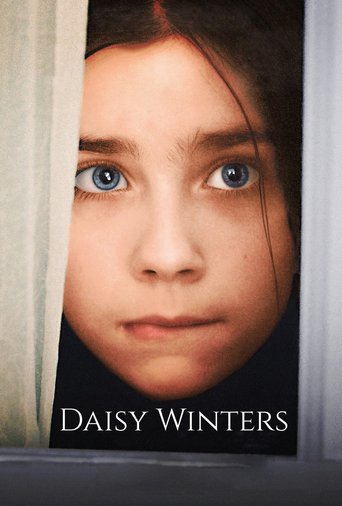
Life and Debt is a 2001 American documentary film that examines the economic and social situation in Jamaica, and specifically how the International Monetary Fund and the World Bank's structural adjustment policies have impacted the island.
Similar titles




Reviews
I like the storyline of this show,it attract me so much
If you don't like this, we can't be friends.
A lot more amusing than I thought it would be.
what a terribly boring film. I'm sorry but this is absolutely not deserving of best picture and will be forgotten quickly. Entertaining and engaging cinema? No. Nothing performances with flat faces and mistaking silence for subtlety.
This film, though somewhat simplistic and emotional (for obvious reasons), does an excellent job of conveying to a broad audience some of the negative effects of globalization on a small, developing economy like that of Jamaica. One often hears critiques of international capitalism and the lending policies of the IMF and World Bank, but in most cases the criticism lacks pertinent examples of the direct impacts of globalization, or fails to make an effective case for why we should care. This film manages to do both, by providing relevant facts (increases in national debt over time, predatory interest rates tied to 'development' loans from the World Bank, critical industries undercut by international competition, etc.), and illustrating the ground-level effects on Jamaican citizens both visually and through numerous informative interviews. The film is interspersed with scenes of oblivious American tourists enjoying their vacations at expensive Jamaican resorts safely isolated from the surrounding poverty, to highlight the developed world's ignorance about the plight of Jamaica and similar underdeveloped countries.As a precondition for aid, the IMF and World Bank usually require that developing countries drop any significant barriers to trade. When the doors are opened to international trade, lower-priced goods from abroad undercut local goods, and eliminate the market for any industry that cannot compete with the mass production that larger economies are capable of. While opening barrier-free worldwide markets for goods and services benefits the large economies already in a position to compete on such a scale, the sudden and forced introduction of 'free' trade to underdeveloped economies often disrupts domestic industries, which are given no opportunity to transition. While the consumer market is suddenly flooded with relatively cheaper goods (cheap enough to undercut the local competition, not to benefit consumers in any way), globalization fails to provide domestic producers with the inputs and capital (fertilizer, machinery, etc.) necessary to compete with producers abroad. As a result, the economy is robbed of its traditional sources of income and capacity for self-sufficiency, instead becoming reliant on weak foreign aid and tourism as national poverty continues to increase.
As a development worker in Jamaica, I can say that there is a lot of painful accuracy in the movie. Yes, tourists do act that badly, almost unanimously if you only count the ones who spend their time here locked away in a guarded resort. And now over half of ever tax dollar goes to paying foreign debt...
This is the Jamaica the tourists see, says the narrator in Stephanie Black's documentary Life and Debt, a country of lush jungles, clear blue water, and sandy beaches. Beyond the luxury hotels, however, is a third world country fighting poverty, crime, and hopelessness. Based on the novel by Jamaica Kincaid A Small Place, Life and Debt, the film studies the effects of the policies of the International Monetary Fund (IMF) and the World Bank on the economy of Jamaica, focusing on the impact of economic globalization on the dairy farmers and factory workers. Backed by a soundtrack of native reggae music, Life and Debt is filled with economic facts that require some knowledge to fully understand. You don't need a master's degree in Economics, however, to understand the desperate faces of children in poverty, the agony of farmers who can't sell their crops, or the hopelessness of factory workers who earn the equivalent of thirty US dollars per week. Black interviews former Prime Minister Michael Manley who explains how the current situation came to be. When Jamaica achieved its independence in 1962 after being a colony of Great Britain for 400 years, help was needed to build its economy. The International Monetary Fund (IMF) and the World Bank gladly supplied this money in the form of short-term loans. These loans though came with strings attached. Subsidies to local farmers were prohibited and tariff barriers were lowered to allow cheap foreign goods to come into the country, inevitably driving local industries out of business. What's remains is tourism, sweatshops and fast-food chains. Manley blames the big Western powers that have used Jamaica for cheap labor and easy sales. For example, thanks to huge subsidies other countries including the United States exported powdered milk to Jamaica at an excessively low price, forcing the local dairy industry to shut down. He also points out that big American businesses like Chiquita, Dole, and Del Monte have worked to stifle exports of local Jamaican bananas. Manley asks of the IMF, "You ask, 'In who's interest? I ask, 'Who set it up?" Watching this documentary, it became clearer to me why thousands of people took to the streets in Seattle to protest the WTO Conference. It may not be widely known but the WTO has established ground rules that make it easier for the developed countries to market their products in third world countries. Under WTO rules,1. Governments are not allowed to pass laws that favor local firms and discriminate against foreign-owned corporations.2. Governments are not allowed to prevent foreign nationals from buying a controlling interest in local companies.3. Governments are not allowed to subsidize domestic companies.4. Governments are not allowed to pass laws that would provide favorable terms of trade to particular trading partners.Ralph Nader said it all when he described globalization as being the subordination of human rights, environmental rights, and consumer rights. The International Monetary Fund, the World Bank, and the Inter-American Development Bank now own almost every facet of the Jamaican economy and the only ones that are making money are franchises like McDonalds, Wendy's, and Burger King who contribute little more than unskilled low paying service jobs. If you are thinking about asking the IMF to change its policies, keep in mind that any change in IMF policy requires an 80% approval and the richest nations such as the United States, Western Europe, Japan make up more than 80% of the vote. Life and Debt, like the recent film Bowling for Columbine, is one-sided, in your face, and may appeal only to those already in agreement. However, its images are so vivid that, for the first time, you may experience the human impact of policies that can turn the world into "one big casino".
LIFE AND DEBT / (2001) *1/2 (out of four)Documentaries are probably the easiest kind of movie to make-no demanding actors, expensive special effects, enormous filming crews, or massive budgets. However, covering such specific topics, documentary movies are probably also the hardest kind of film to make entertaining. Michael Moore does it best when he injects a cunning wit into his documentaries like "The Big One" and "Roger & Me." 1999's "Barenaked in America," detailing a Canadian band, also entertained audiences while still supplying interesting information on the subject. "Life and Debt" does not do this. It contains an appropriate style, but lacks interest. For most of us, when we think about Jamaica, we think of a popular vacation spot. Who wouldn't enjoy it's beautiful locations, warm weather, and welcoming atmosphere. American's can even enter with a delusion of wealth since thirty Jamaican dollars equal approximately one US dollar. But "Life and Debt" does not exploit the location as an exotic locale, it examines how the International Monetary Fund, the World Bank, and other aid organizations have changed the Jamaican economy over the past several decades. The movie examines how agriculture, industry, government, and culture have been restructured by import-export systems, forcing the locals to live in poverty and work in sweatshops. Director Stephanie Black does not take the normal approach to such material. She injects a sarcastic style into the scenes. An effective reggae soundtrack-including songs by Bob Marley, Ziggy Marley, Mutubaruka, and Peter Tosh-seasons the film. Unfortunately, despite the filmmakers' attempts, the spices do not rid the stuffy scenes of a stale aftertaste. Author Jamaica Kincaid, whose book "A Small Place" inspired the film, guilds the audience on a tourist's journey through the visually stunning country. On a technical level, this is a good documentary; it makes good points about the topic. It surprises us while proving wrong our assumptions about Jamaican.If you are interested in this kind of thing, this is definitely the movie to watch. But if you're not particularly interested in this topic, it's difficult to care about currency, economics, banana production, the country's poverty, etc. I found myself daydreaming, looking at my watch, dozing off. For me, this was a tedious, tremendously boring experience. Though we can't accuse this movie of miscommunication. After watching the movie, we will all see Jamaica in a new light that is, if we are still awake.
Top Streaming Movies












